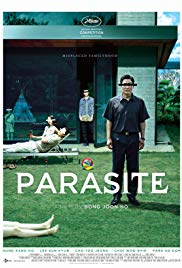‘Parasite’: A thrilling film worming its way into American theaters

IMBd
My sister leaned over and whispered that the movie I had just settled down to watch was in Korean, which of course, she neglected to tell me ahead of time. I was in the mood for a light-hearted rom-com, not an art-house movie in another language, and so I was irritated.
But as soon as the first scene was over, I was completely engrossed.
“Parasite” is a South Korean dark comedy and thriller directed by Bong Joon-ho. It first debuted at the Cannes film festival this year in May where it won the Palme d’Or and became the first Korean film to do so.
The genre-blending film mixes social commentary, humor, horror and thriller to both engage and entertain while allowing a glimpse into South Korean culture.
Also worth noting is the beautiful cinematography. The sets were stunning and each frame was purposeful. For example, instead of shooting a tutoring scene from head-on with both characters centered squarely in the frame, the scene was shot from alternating perspectives, using the back of the other person’s head as a frame for the scene.
I could tell that it was a priority to the director to imbue beauty into every scene and that added another layer of artistry and complexity to the film.
“Parasite” follows a poor family of four living in a semi-basement apartment. The family is struggling to stay financially solvent, working odd jobs here and there to keep food on the table.
Just when things are getting dire (A.K.A. the phone plans run out) the son’s friend offers a job to the son as a substitute English tutor for a young, wealthy girl.
The son, Ki-woo, alias Kevin, gets the job after a little lying and eventually hatches a plan. After realizing how wealthy the Park family is (and how well he was being paid) he quickly installs his family members into other positions in the house.
He convinces Mrs. Park to hire his sister, Ki-jeong or Jessica, as her troubled son’s art teacher. Next, they get the driver fired and their father Ki-taek is hired to take his place. Finally, after an artfully elaborate prank, they fire the housekeeper and in her place hire their mother Chung-sook.
The initial part of the movie is entertaining, acting as a simple exposition to what develops into a serious film. I was entertained and delighted by elaborate pranks which made the movie easy to love.
While the main characters were underdog types, the movie did not rely too heavily on this trope; it acted as more of an introduction as the characters developed.
Watching the poor— but scrappy and intelligent— family worm their way into the lives of a wealthy family was not only entertaining but extremely pertinent.
While I am not particularly knowledgeable about social problems in South Korea, I was still able to recognize how important and increasingly problematic the gap between lower-class and upper-class families is in South Korean society.
As the poor family was experiencing the wealth and privilege of the Parks in contrast to their own lives, viewers could see the jealousy and rage begin to bubble as they became increasingly aware of the inequity in their country.
While I was touched by how profound the social commentary in the movie was, it was rather subdued. There were a few conversations about that hinted at inequality but it was more of a subtle theme than an explicit problem. This made the movie more interesting and effective at drawing attention to a larger problem.
Aside from the social commentary aspect, “Parasite” also infused horror and thriller genres into the plot line, which kept me guessing the whole time.
“Parasite” is like no movie I have ever seen before. The incredibly unique plot, beautiful cinematography and mixing of genres created a beautiful finished product that was excellent on all accounts.
Your donations directly fund the Lane Tech student journalism program—covering essential costs like website hosting and technology not supported by our school or district. Your generosity empowers our student reporters to investigate, write, and publish impactful stories that matter to our school community.
This website is more than a publishing platform—it's an archive, a research tool, and a source of truth. Every dollar helps us preserve and grow this resource so future students can learn from and build on the work being done today.
Thank you for supporting the next generation of journalists at Lane Tech College Prep!

Maggie Nielsen and has been writing for the Warrior since the fall of 2017. She is the president of Podcast Club, a member of Printmaking Club and runs...





